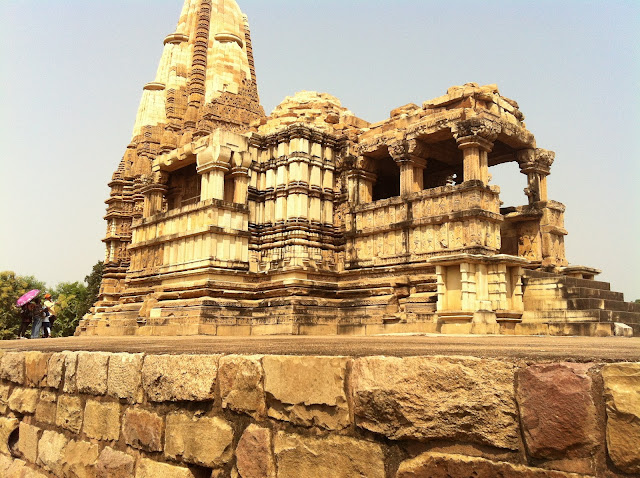In
India ,
at least when it comes to policy-making, it is not only reforms that is needed
but intellectual capital, and that is a decades-long project… Not only does the
country lack in erudite statesmen, but it also has no concept of an open
society… Due to poor funding and frustrating regulations in India ’s
educations sector, there is not a single Indian university that stands out for
an exceptional humanities programme. The average Indian’s aversion to the
humanities has also hurt recruitment to the arts, but with poor faculty,
atrocious library collections, a pervasive Marxist bias, and non-existent
little opportunity in government or business, there is little to motivate young
students to opt for the humanities over professional schools which will in all
likelihood result in better-paying jobs. India lacks not only a talent pool
of young and budding humanities scholars but also the mindset to develop such a
workforce.
Bereft
of all frills, Gandhi’s actual legacy is just twofold. One, he
killed the spirit of free, fearless and robust intellectual discourse, which
was thriving until the time of Balagangadhar Tilak and later, briefly,
Aurobindo Ghosh. It is worth recalling what D.V. Gundappa wrote (which I’ve translated earlier) in this connection as early as
1928. “Thus the national atmosphere of discourse quickly became one where
nobody could ever think of something different from what Gandhi thought. The
minds of the general public—both literate and otherwise—soon became habituated
to conformity, which then turned to blind loyalty towards a partisan idea.”
MK
Gandhi was an opponent of the socialist ideology Arvind Kumar DNA Monday, October 1, 2012
Socialists
around the world never fail to use the name of Mohandas Gandhi to push their
agenda. However, Gandhi was far from being a leftist, and his political
positions were in direct opposition to the left…
If
yoga’s Hindu roots create such anxiety by challenging Western religious
pre-eminence, then how might Gandhi, who successfully challenged Western
Universalism, leading and winning India’s fight for independence non-violently,
fare in the West? Already we see attempts to co-opt Gandhi. A recent bizarre
incident uncovering Gandhi’s posthumous baptism by the Mormon Church is an
example of one such attempt of laying claim to him. (Gandhi himself deplored
the practice of conversion by Christian missionaries in India ).
Most
Western authors on Gandhi will emphasise the influence of the New Testament on
Gandhi. Indeed Gandhi spoke favourably of many passages in the New Testament
and of Jesus, but never as passionately or as extensively as he did of the
faith to which he belonged. In fact, Gandhi was being entirely true to his
pluralistic Hindu beliefs in his respect for all faiths and not just his own.
In
Peace Education studies in American universities, Gandhi’s success is
attributed largely to the “context” – the apparent benevolence of British
colonists in providing the fertile field on which he could exercise his
non-violent agitation. (Gandhi himself had said that non-violent resistance
could work in most situations, albeit with great sacrifice). Gandhi is
routinely discussed in virtual isolation from his followers, the large and
diverse group of eminent thinkers, and the Indian masses who very early
embraced Gandhi’s non-violent practices spontaneously.
If
Gandhi led, then millions of Indians, similarly inspired, agreed wholeheartedly
and followed. Keeping Gandhi, but dumping his Hindu influences is already being
attempted in Western scholarship. Fortunately, Gandhi, a prolific writer
documented his own life and struggles quite extensively. Moreover, as his
writings record, he dove deep into Indian culture, drawing upon it to frame the
Indian independence struggle in terms that would resonate with his countrymen.
His autobiography reveals that his moral life was anchored in his Hindu faith.
In my view, Gandhi (and his ideas) resisted digestion because, quite cannily,
he used Sanskrit words to give voice to India ’s struggle and demands. Words
like satyagraha, swadeshi,swaraj, ahimsa, sva-dharma became
an integral part of the lexicon of the Indian freedom struggle. By using these
words and not their English equivalents, Gandhi preserved the complete range of
their complex meanings, their dharmic origins and their cultural context.
A Must Read for Students of Indian HIstory May
25, 2011 By V.
Lakshminarayanan The crux of the message of the book was saved for the last
two chapters, 'Epilogue' and 'Hindsight-Foresight'. The two chapters provide a
revealing commentary on the discourse of Indian history in our own time:
First,
it is the story of the politicians of the Indian National Congress hijacking
history and claiming exclusive credit for the departure of British from India … Second
is the tragedy of the Indian history being held hostage by the Marxists and the
Indian academics who are under the intellectual slavery of the Macaulay
influenced English education. Unfortunately this hijacked history has been
accepted by the mainstream population which is an even greater tragedy. A
nation which does not know where it came from and how it got there will not
know where it is going, and will not get where it wants to. "Tatya
Topé's Operation Red Lotus" is a must reading all students of Indian
history, for it logically resolves many of the puzzling events of 1857 war and
provides the total picture in a clearer perspective.
Based
in USA ,
Parag Topé is the founder and part owner of Vistarus.
A relentless passion for history, combined with a master's degree in
engineering and an MBA in strategy, makes Parag the chief architect of the
book.




No comments:
Post a Comment